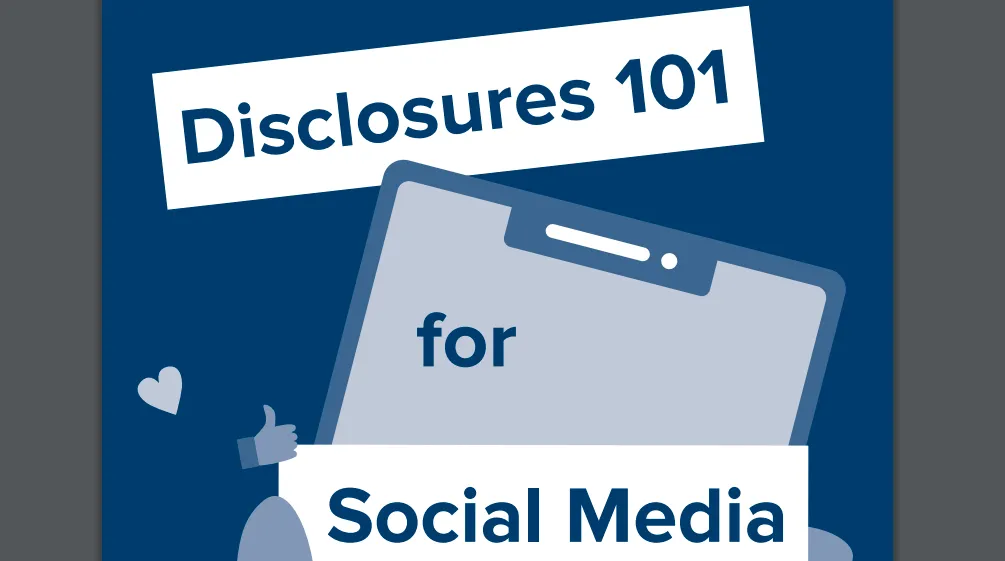(The image is from a PDF produced by the FTC. Documents produced by the US Federal Government are in the public domain by default.)
In 2009 the Obama Administration issued a suite of FTC Disclosure Rules. The Obama Administration rules required publishers to place a large yellow box disclosing any financial arrangements with a web site before including links to the web site.
The Obama Administration went after several small web sites and advertising companies and managed to shut down numerous small businesses with their onerous rules. The Obama Administration tended to go after web sites with Conservative or Libertarian views. The Obama Administration was also smart to target small businesses that could not afford legal counsel.
The Obama Administration did not go after companies like Google, Facebook or Twitter as they tend to give donations to the DNC and they tend to help spread left wing propaganda.
Anyway, I worked with small advertisers who were trying to comply with the rules.
The 2009 FTC Disclosure rules required that web sites put yellow box atop any page that had an affiliate link.
As the FTC rules required, I added a yellow FTC disclosure a top every page that had either an affiliate or referral link.
As one might expect: My web site traffic drop. The click through rate on the links dropped. Sales through the affiliate links dropped to zero.
Democrats reading this posts could say that my sales dropped to zero because I was obviously misleading people. The FTC warning saved people from using my site and encouraged people to use Google and Facebook instead.
The Obama FTC Disclosures were absurd. The site had page after page that accused marketers of transgressions. Their actual requirements were even more absurd.
I wanted to link to the FTC articles and point out the extremely negative wording and absurd implications of the FTC rules. But, wouldn't you know it, the Trump Administration streamlined the disclosure rules and pulled out most of the absurd text. The FTC's 2019 Disclosure PDF is only seven pages and mostly images.
The Trump administration pulled out the visceral attacks on ecommerce.
Personally, I think the disclosure rules are bunk. We all have mutually beneficial relations in our lives. For example, employment is a mutually beneficial relation. Including a link to your employer in an online resume could be considered a promotion and require an FTC disclosure warning.
Because I might get money for my HIVE posts, the FTC rules required that I put a big yellow warning before every link to HIVE.
My second picture is an image of a beanie doll with the SMEAD logo. I found this doll in a bag full of promotional materials at a business conference. This doll might be worth as much as $5. It is worth more than most affiliate programs.
If I linked to SMEAD Corporate; do I need to include the fact that I once received a promotional product from the company? I emphasize, this doll is worth more than most affiliate relations are worth.
At the same conference, I received a free slice of pizza from a small business that built a trailer with a pizza oven. The company offered catering services. The business would haul the pizza oven to an event and cook pizzas at the event.
The company gave out free pizzas to promote this idea.
According to the FTC rules, I would need to include a disclaimer about my eating a morally suspect slice of pizza on any page that talks about catering services that have trailers to bake pizzas at events.
Writing a review after receiving a free product is a sin.
The FTC strongly denounces people who write reviews without ever having tried the product. I made a page about the Aptera. Aptera designed a solar powered car that they hope to start producing later this year.
I have to make a confession.
I haven't driven an Aptera. Yes, I've committed the sin of promoting a product that I haven't tried.
According to the FTC, my act of promoting the Aptera is a grave moral transgression.
Aptera has designed a solar powered car which they hope to bring into production this year. They have yet to finalize their assembly line and there are no production Apteras on the market.
The production Aptera doesn't exist. No-one has driven a production Aptera!
Every single person who is using the Aptera referral link is in violation of FTC rules!
The company might be a complete and total scam. The statement is true of every new company that develops a product. We won't know if Aptera is a scam for another year.
But I don't care. Companies need support in their initial phase of development than at other times.
I guess I will end this article on the FTC Disclosure rules with another little secret.
Here is my secret:
Deep in my heart I despise the petty bureaucrats at the Federal Trade Commission. The FTC has a long history of creating regulations that allow politically connected companies like Google and Facebook to run roughshod over the community.
The FTC routinely fails to protect people from actual fraud (which is easy to prove by the large number of frauds which have existed since the inception of the FTC). The only thing the FTC is good at is intimidating honest companies which are seeking organic mechanisms for engaging the public.
I personally find the FTC to be a thousand times more repugnant than the marketing practices that the FTC denounces. The FTC rules always favor politically connected businesses to the people at large.
I personally think every web site should have a referral program and people should be free to use the damn referral codes however they please. People should not be required to apologize for using referral links.
Most referral programs do nothing. They simply allow the web site owners a way to see which promotion efforts resulted in traffic.
Yes, there are companies that are fraudulent and people who are spammy. We, as individuals, should call out spammy and fraudulent activities. I dislike people who overload forums with spam. But I see the bureaucrats at the FTC to be a lower form of being than the spammers.
PS: I appreciate that the Trump Administration streamlined the FTC disclosure rules. I couldn't find the wording that required a yellow block at the top of the page in the 2019 version of the regulations.

